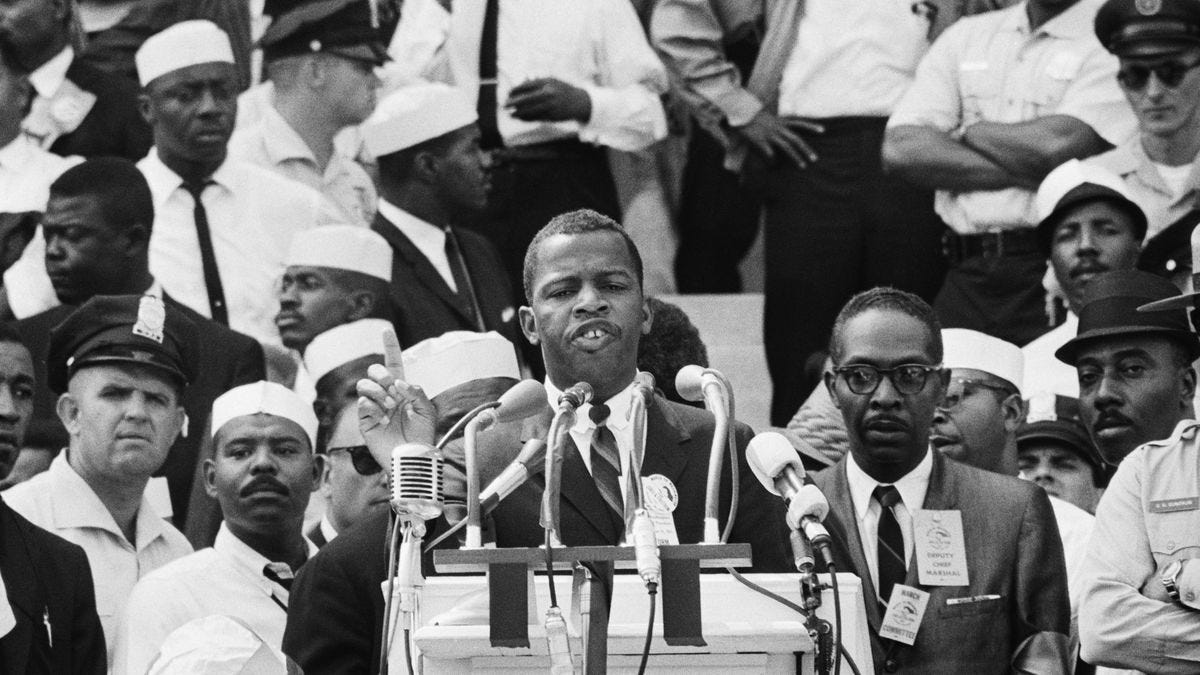I asked my friend Stephen if I could use his words to commemorate Civil Rights icons Congressman John Lewis and C.T. Vivian, who died yesterday, on the same day, July 17. Both were devoted to the cause of justice and freedom, men of immense faith, friends of Dr. King, and willing to live lives that very few Americans dare to live.

John Lewis, at 23, was the youngest speaker at the March on Washington on August 28, 1963. And we wonder why people work so hard to put down young people. | Bettmann Archive/Getty Images
Stephen references a documentary about Lewis that came out two weeks ago; info at the end about how to watch it.
Here’s what Stephen said:
I am deeply saddened tonight to hear of the deaths of both John Lewis and C.T. Vivian, two of the organizers of the Nashville lunch counter sit-ins, two prophetic voices fighting for an idea of a better America, of what we could someday be, if we want it, incredibly dying on the same day. I can only think of Lewis’ exhortation to get into “good trouble, necessary trouble,” in pursuit of a country more just—a philosophy soundly condemned by the world into which I was born and formed—and am chastened by my own inaction, the times I’ve gone along with how things were instead of fighting for something better. I jotted down some thoughts last week after watching the new documentary about Lewis, and then felt they were unfinished, but I wanted to post them here now, in hopes that more will watch this documentary and be provoked into action.
I spent the afternoon of the Fourth of July rereading (as only seemed fitting these days, remembering the full history of this country) “A theology for racism: Southern Fundamentalists and the civil rights movement,” an academic paper written by Dr. Bill Leonard of the Wake Forest University Divinity School that focuses on statements made by my great-grandfather, the Independent Baptist author and publisher John R. Rice, condemning civil rights workers who were organizing “sit-downs, pickets, strikes and lawbreaking.” He responded to the Supreme Court rulings on integration by writing a pamphlet, in 1956, entitled Negro and White, that was "a plea for patience, for moderation and for less agitation and pressure while good men work out problems.” While “good men” work out the “problem” of allowing another person, someone who looks different from you, to sit next to while you’re eating your grilled cheese sandwich. A “plea for patience” while “good men” work out the “problem” of allowing someone who looks different from you to sit next to you in the movie theatre, to be allowed to enter the theater through the same front door, instead of going down a dark alley in search of a back door marked for their usage.
And so it was something to follow that reading by watching this new documentary about Congressman John Lewis to see footage of the sit-ins in downtown Nashville in 1960, vehemently condemned by my great-grandfather, protests that took place 10 minutes from where I type these words. Rice repeatedly defended those who were just trying to defend “Southern white womanhood” (a defense I heard come from my grandmother’s mouth during those years I lived with her), those plainly worried that if any mixing were allowed, it would only “result in intermarriage and the mongrelization of the race and the breakdown of all the Southern standards of culture” (to quote him precisely).
And today? I am dumbfounded and astounded and saddened, watching another family member amplify the voices of white supremacists and supporters of white supremacy (is there a difference?—I don’t know what it would be), writing furious missives against any form of protest, using the same words and arguments as our great-grandfather. Lamenting, like our president, the (tragically overdue) narrowing of public spaces where it is safe and encouraged to celebrate “Southern white womanhood”—the dog whistles are deafening—with confederate flags and monuments and angry condemnations of all who want an honest reckoning with the past. Who are, incredibly, furious at their loss of the NFL and NASCAR as safe spaces for white supremacy. May the future bring ever more of these changes, symbolic and concrete, and ever larger crowds committed to getting into good trouble, necessary trouble, in pursuit of a more just society.
You can watch John Lewis: Good Trouble on services including Amazon, iTunes, Google Play, YouTube, and Vudu. For a complete listing, see the film’s website.
And you can follow Stephen here.


